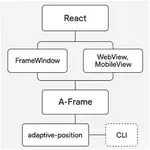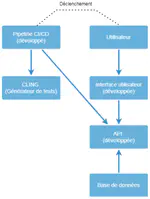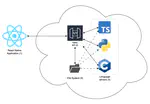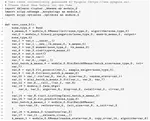Msc Thesis
As creative coding in interactive art becomes increasingly popular in the digital art world, the need to test work to ensure that it matches the artist’s expectations is essential. The problem is that the programs supporting these works can behave unexpectedly or cause problems. Some studies have shown that is possible to test these projects manually, but the use of automated tests has been little studied. The research aims to explain to what extent it is possible to implement automated tests for functional and performance testing in interactive installation projects using hybrid development tools. To answer this question, we performed a case study on the Wall of fame project in TouchDesigner. Observations on automated test experiments and an interview were made. The results of the observations showed that it was possible to carry out functional and performance tests with limitations on the reliability of the data. Difficulties were identified : TouchDesigner dependencies, operator limitations, user interface interactions, lack of native test environments, performance test limitations and maintenance difficulties. Solutions have also been found to resolve these issues.
The field of automated test case generation has grown considerably in recent years to reduce software testing costs and find bugs. However, the techniques for automatically generating test cases for machine learning libraries still produce low-quality tests and papers on the subject tend to work in Java, whereas the machine learning community tends to work in Python. Some papers have attempted to explain the causes of these poor-quality tests and to make it possible to generate tests in Python automatically, but they are still fairly recent, and therefore, no study has yet attempted to improve these test cases in Python. In this thesis, we introduce 2 improvements for Pynguin, an automated test case generation tool for Python, to generate better test cases for machine learning libraries using structured input data and to manage better crashes from C-extension modules. Based on a set of 7 modules, we will show that our approach has made it possible to cover lines of code unreachable with the traditional approach and to generate error-revealing test cases. We expect our approach to serve as a starting point for integrating testers’ knowledge of input data of programs more easily into automated test case generation tools and creating tools to find more bugs that cause crashes.








